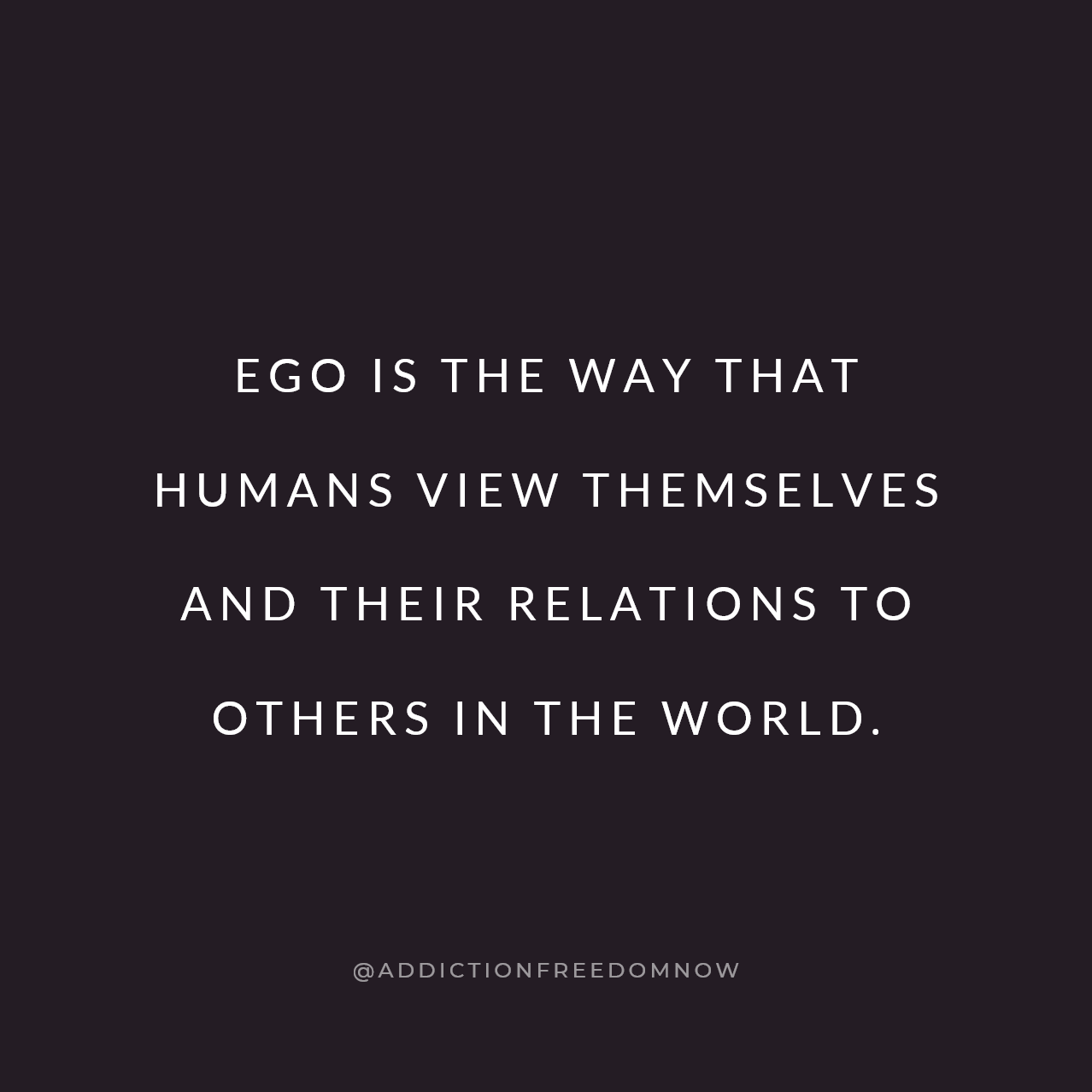There are many challenging and complex aspects of life without substances that will be discovered along the road to recovery from SUD. For example, the role your ego plays in your ability to find recovery can be huge, especially if it played a role in the formation of your SUD to begin with. As such, it can be beneficial to explore ways to better understand and manage ego in addiction recovery.
The concept of ego is multifaceted and can even be a bit mysterious. As is the case with many things in life, an ego can have positive effects on things like self-confidence and career, but it can also have negative effects on SUD recovery.
Ego in recovery can both affect and be impacted by the way you think of yourself. Egos can often be distorted by the process of active addiction and recovery. Let’s explore how alterations in your sense of self can complicate the struggle with drug and alcohol use disorder.
Why Understand the Ego?
Understanding the ego can provide valuable insights into the human mind and how our desires, fears, and motivations are connected and influenced by one another. Behavior patterns and thought processes can also be explored by building a deeper understanding of the ego. Through these components of the whole self, the ego can develop and formulate our sense of self-worth and self-identity. This can directly impact the way we communicate and interact with others.
With a better sense of what the ego is and how it is involved in the various aspects of our lives, we can communicate more effectively and resolve conflicts with a greater degree of understanding of one another. Developing a clearer knowledge of your own ego could lead you to a broader appreciation and comprehension of other individuals’ egos, which can help in conflict resolution as you approach recovery.
Definition of Ego

The Role of Ego in Our Lives
Ego is possibly the greatest psychological driver in our lives. Our ego is our sense of self-worth, and it propels us to make many of our decisions. The ego’s job is to feel important or validated. In many ways, your ego can feel the need to fight or defend itself in certain situations. It may seem counterintuitive, but there are times when the ego needs a negative situation to arise so it can have something to do, change, or worry about.
For the times when you are happy and it may seem like there is nothing to worry or stress about, your ego could be looking for issues that it can cling to or for drama to create. It is also common for our egos to live in the past and future, not the present. It is a fact that only the present exists right now; the past and future only exist in our minds. Nevertheless, our egos want us to focus on the past or future.
For example, if you think back to a time when someone was impolite toward you and you felt offended, that may be your ego that is talking. If you have a big event coming up and you are worried about it, you may be experiencing your ego attempting to protect you against embarrassment or being caught unprepared. Our egos love to live in the past and future, so they try to influence our actions in the present.
The Impact of a Big Ego on Personal Relationships and Self-Perception
While the ego can help us protect ourselves against impending issues, an overdeveloped ego that is too focused on the self can often result in a lack of empathy and consideration for others. Due to this, people who allow their ego to rule their decisions (known as having a “big ego”) can push people away or treat others callously. This can cause relationships with others to suffer.
A big ego can also lead people to struggle with criticism. We may interpret fair criticism as a personal attack and then allow our personal relationships to deteriorate. Worse, opportunities for self-improvement can be lost as we focus on promoting the self.
Ego and Addiction
A big or inflated ego can be very hazardous during the recovery process for a person with substance use disorder. For example, we may allow our ego to get the best of us, and we assume that we are capable of more than we really are. Other times, we can become complacent and overlook our need for support because we believe that we have all the necessary answers ourselves. Understanding the role of ego in addiction recovery is key to a successful effort.
An unhealthy ego can affect your battle with addiction in several ways.
It can lead you to:
- Struggle with denial. Drowning in self-denial can cause disaster. If you display actions of denial, you cannot fully get the help you need.
- Struggle with a sense of belonging. You may be peer-pressured into continuing to abuse drugs or alcohol, or you may use them to feel like you fit into a group of people.
- Struggle with self-image. Some people struggle with substance use because they use it to numb unpleasant feelings that they have about themselves.
- Struggle with control. The use of substances can often leave you feeling like you are invincible or are in ultimate control.
- Struggle with the desire to self-medicate. Some struggle with substance use because they use it as an escape from their mental struggles or other issues.
Explanation of the Term “Big Ego” and Its Dangers in the Context of Addiction
The ego is a normal, healthy component of the human psyche, it is beneficial for us to have a strong sense of ourselves and who we are. However, a big ego or an ego that is left unchecked can prove to be dangerous and have negative effects. Big or unchecked egos are often described as self-centeredness and demonstrating the belief that you are superior to others. This can lead to a need to always be right and a tremendous lack of empathy for others.
A big ego can cause a lack of awareness, false contentment, carelessness, and isolation. All these factors can make it more likely for you to put more stock into making yourself feel good than putting work into your relationships with others. Worse, as you become more likely to fall into substance use, it is often more difficult for you to accept that there is a problem, admit that you cannot likely solve it on your own, and seek the help you need to address it.
How Inflated Ego Contributes to Addiction
Ego, if left unchecked, can lead us to feel overconfident or develop a belief that we are no longer susceptible to relapses or future challenges as they relate to SUD. An ego can hinder the growth you need to build relationships with others. It can also lead to a mindset that insulates or traps you into believing that you don’t need any help or that you will be fine on your own.
The Role of Ego in Life with Addiction
An ego can have a very self-destructive impact on your life, especially if you struggle with SUD. For example, ego can be disrupted by past experiences – our fears, insecurities, and traumas can leave us feeling broken and cause us to seek relief from the negative emotions that we feel. This is why many people who are struggling with SUD attempt to find relief without the help of others and through the use of substances. Once the cycle is created, it can be very difficult to break.
The Role of Ego in Recovery
It is important that we understand the role of ego in addiction recovery. Not only can ego give us a push toward substance use, but it can often get in the way of your commitment and progress toward recovery. Egos often have to be set aside during recovery because they are used to a way of thinking and behaving that the recovery process is trying to break.
How Ego Can Hinder Recovery
If we let our ego dominate our way of thinking, it can often lead us to be stuck in our ways and feel like we have all the answers. An ego can hinder the recovery process by causing us to be resistant to change, making us less willing to admit our mistakes, and leading us to dismiss or reject the support and guidance that is needed to maintain recovery. An ego can cause you to become trapped in your own isolation, hindering any progress toward recovery.
Examples of Ego-Driven Behaviors in Recovery
A prime example of ego-driven behavior qualities in recovery is obliviousness. A big ego can create such a focus on your own wants and needs that you are oblivious to your actions as well as the needs of others. Ego and pride can become so large that you are unaware of what others are feeling or thinking.
Another example is alienation. It can be common for people to distance themselves from others they love out of shame, or negatively reacting to people they perceive to be inferior. This form of alienation can leave you feeling isolated and with little to no support when you need it.
A third example of an ego-driven behavior is carelessness. During addiction, ego can cause us to be careless with our actions or even demonstrate a lack of care about anything in our lives. A careless mindset when it comes to decision-making, whether those decisions are big or small, can lead to mistakes and regrets in life.
The Importance of Managing Ego in Recovery
Managing ego in recovery is a vitally important step in the recovery process. It requires self-reflection and self-assessment to determine whether your ego is a problem, as well as to seek the humility necessary to self-reflect, thoroughly self-assess, and accept help to improve. One of the most important steps in SUD recovery is to let go of the inflated sense of ego and discover a healthier sense of self that can see you through recovery.
During recovery, it is important to humble yourself and explore your true sense of identity. It can be useful to let go of your preconceived notions of who you are and explore the reasons behind why you think the way that you do. Essentially, you have to deflate your previous ego and allow your life to be transformed by reconstructing your ego in a way that gives you a deeper understanding of who you are and your thought patterns.
Controlling Ego During Your Sobriety Journey

Another option is to explore experiential activities outdoors, such as hiking or camping. Time outdoors can help you reflect on yourself and find different forms of inspiration you may not have previously known.
Finally, a key to controlling your ego during your journey to recovery is discovering humility. Let’s explore the concept of humility as it pertains to ego and recovery.
The Role of Humility in Managing Ego
To successfully manage your ego, you must be willing to display humility. Humility is more than acting humble – it is knowing and acknowledging who you are in relation to the larger context of the universe and accepting that you are not the most important being in existence. Humility allows us to acknowledge who we are and our own limitations, learn from our surroundings and make decisions that leave a positive impact on ourselves and those around us. Humility is one of the best tools that can be used to quiet the ego.
How Does Humility Affect Recovery?
Asking for help is a very important part of recovery, since it is typically the first step in the recovery process. It takes humility to properly self-assess and discover that you have a problem with SUD, admit that it is negatively affecting your life, and seek the proper help. Without acknowledging that you cannot solve the problem on your own, it will be impossible to accept the help you need to reach recovery.
Developing a sense of humility is also a key step toward maintaining long-term sobriety. Humbleness and modesty help one have sympathy for and understanding of yourself and the individuals around you. With humility comes the ability to admit that your relationships have been damaged due to substance use and the willingness to work with your loved ones toward repairing them.
Continue Your Journey Through Recovery
Whether you are struggling with active substance use disorder or are finding it difficult to maintain sobriety, it is important that you seek the necessary support that you need. Humility and knowing that you need help and support around you is often the first step toward improving your life. Fortunately, there are various support networks in place that are designed to help people struggling with SUD.
As you work toward finding and accepting the help available, it is crucial to continue addressing your own ego. Remember: the battle with SUD starts from within. Developing the willingness to forego your own pride and ego can unlock so many recovery resources and avenues for you to explore safely. With a healthy ego, you do not have to face this battle alone; you can speak up and start your journey on the path toward recovery and personal growth.
Take the First Step Now
Keeping the ego in check is a struggle that we all can relate to. Successfully patrolling your ego requires a lot of humility and reflection, and a realistic look at just how big your ego actually is. Take this How Big Is My Ego Quiz today to begin learning about your ego and how it might impact your recovery.
For more recovery resources, tips and tricks, and encouraging words, join our recovery community. Sign up for the Addiction Freedom Now newsletter to learn more about how you can improve your walk in recovery.





